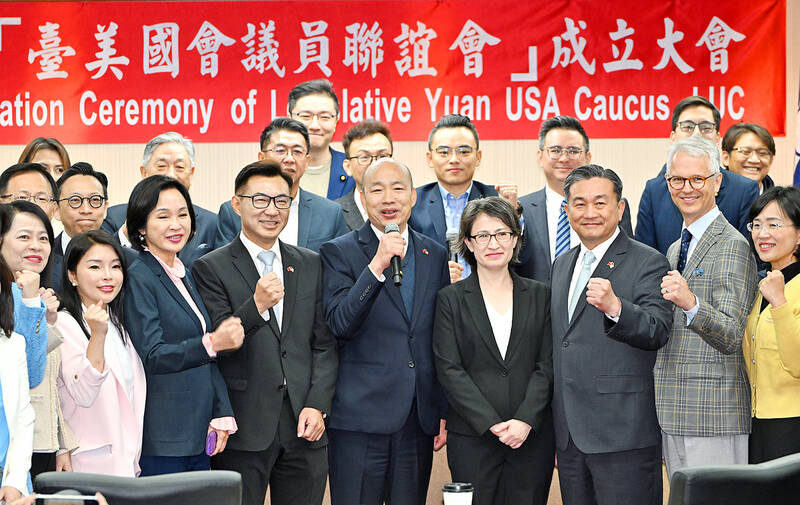A 72-member Legislative Yuan US Caucus has been launched to facilitate the stable development of friendly relations with the US, Legislative Deputy Speaker Johnny Chiang (江啟臣) said.
The Democratic Progressive Party (DPP) and the Chinese Nationalist Party (KMT) were planning to establish separate US caucuses, but agreed to merge them into one after a week of negotiations, DPP Legislator Wang Ting-yu (王定宇) told reporters.
The biggest secondary unit in the legislature is cochaired by Wang and KMT Legislator Ko Chih-en (柯志恩), who said that lawmakers across party lines expressed their willingness to contribute to Taiwan-US relations.

Photo: Tien Yu-hua, Taipei Times
The integration allows Taiwan to be represented by a unified voice while interacting with the US Congress and the US government, which could help facilitate the exchanges, said Chiang, who is also honorary chair of the caucus.
As the US is one of Taiwan’s most important partners, maintaining a stable, firm and friendly relationship with Washington is not only crucial to Taipei’s security and economy, but also to other countries in the region and beyond, he added.
The inauguration overlapped with a visit by heavyweight US lawmakers, including Mike Gallagher and Raja Krishnamoorthi, chairman and ranking members respectively of the US House of Representatives Select Committee on the Strategic Competition Between the US and the Chinese Communist Party.
Guests at the inauguration included Legislative Speaker Han Kuo-yu (韓國瑜), who said the caucus should contribute to better and closer relations between Taiwan and the US.
Vice president-elect Hsiao Bi-khim (蕭美琴), former chair of the previous Taiwan-US caucus when she served as a legislator, said that she was happy to see cross-party legislators coming together in the name of diplomacy.
American Institute in Taiwan (AIT) Acting Director Jeremy Cornforth said that the US Congress firmly supports Taiwan, as exemplified by frequent visits by US delegations, 45 years after the passage of the Taiwan Relation Act.
The caucus consisting of cross-party lawmakers demonstrates that Taiwan-US relations have received widespread support from political circles and the public, he said, adding that the US and the AIT are ready to work with the legislature.
Separately, the Taiwan-Australia and New Zealand Inter-Parliamentary Amity Association initiated by DPP Legislator Chiu Yi-ying (邱議瑩) was established yesterday, aiming to seek trilateral cooperation in green energy, agriculture and economy.
Chiu said that she was honored to chair the association for the third term, adding that she hoped association members would be able to travel to Australia and New Zealand to meet with their counterparts, which they were unable to do during the COVID-19 pandemic.
They would like to learn more about green energy and agricultural developments in the two countries, and seek further economic and trade cooperation, she said.
Australian Office in Taipei Representative Robert Fergusson said that Canberra could provide stable and reliable energy for Taiwanese companies to operate smoothly and that it supports Taiwan’s goal of achieving net zero carbon emissions through cooperation in wind energy and hydrogen energy.
New Zealand Commerce and Industry Office Director Mark Pearson said that he hoped the association could help the legislature gain a deeper understanding of his country and create more opportunities for cooperation and mutual benefit.
Separately, the Taiwan-Israel Congressional Association was established yesterday to promote people-to-people exchanges; cooperation in agriculture, technology and education; and bilateral visits, association chair DPP Legislator Chung Chia-pin (鍾佳濱) said.
Israeli Representative to Taiwan Maya Yaron thanked Taiwan for supporting Israel and said that a parliamentary delegation is to visit the nation in the next few weeks.

POSITIVE DEVELOPMENT: Japan and the US are expected to hold in-depth discussions on Taiwan-related issues during the meeting next month, Japanese sources said The holding of a Japan-US leaders’ meeting ahead of US President Donald Trump’s visit to China is positive news for Taiwan, former Japan-Taiwan Exchange Association representative Hiroyasu Izumi said yesterday. After the Liberal Democratic Party’s landslide victory in Japan’s House of Representatives election, Japanese Prime Minister Sanae Takaichi is scheduled to visit the US next month, where she is to meet with Trump ahead of the US president’s planned visit to China from March 31 to April 2 for a meeting with Chinese President Xi Jinping (習近平). Japan and the US are expected to hold in-depth discussions on Taiwan-related issues during the

‘LIKE-MINDED PARTNER’: Tako van Popta said it would be inappropriate to delay signing the deal with Taiwan because of China, adding he would promote the issue Canadian senators have stressed Taiwan’s importance for international trade and expressed enthusiasm for ensuring the Taiwan-Canada trade cooperation framework agreement is implemented this year. Representative to Canada Harry Tseng (曾厚仁) in an interview with the Central News Agency (CNA) said he was increasingly uneasy about Ottawa’s delays in signing the agreement, especially as Ottawa has warmed toward Beijing. There are “no negotiations left. Not only [is it] initialed, we have three versions of the text ready: English, French and Mandarin,” Tseng said. “That tells you how close we are to the final signature.” Tseng said that he hoped Canadian Prime Minister Mark Carney

President William Lai (賴清德) yesterday bestowed one of Taiwan’s highest honors on Saint Vincent and the Grenadines (SVG) Ambassador Andrea Clare Bowman in recognition of her contributions to bilateral ties. “By conferring the Order of Brilliant Star with Grand Cordon on Ambassador Bowman today, I want to sincerely thank her, on behalf of the Taiwanese people, for her outstanding contribution to deepening diplomatic ties between Taiwan and SVG,” Lai said at a ceremony held at the Presidential Office in Taipei. He noted that Bowman became SVG’s first ambassador to Taiwan in 2019 and

A man walks past elementary school artworks at the Taipei Lantern Festival in Ximen District yesterday, the first day of the event. The festival is to run from 5pm to 10pm through March 15.